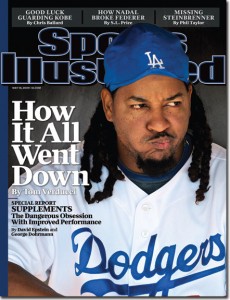 Sports Illustrated recently highlighted what appears to be an improper relationship between the International Society of Sports Nutrition and the nutritional supplement industry:
Sports Illustrated recently highlighted what appears to be an improper relationship between the International Society of Sports Nutrition and the nutritional supplement industry:
Even supplement makers that submit their products for independent testing have trouble escaping the appearance of impropriety. In 2008 VPX funded a study by Willoughby on one of its products, a fat burner called Meltdown, but only after it was already on the market. That study appeared in the journal of the International Society of Sports Nutrition (ISSN) in December. The CEO of ISSN is Jose Antonio, who had been an employee of VPX for almost a year before the study’s publication.
In fact, Jose Antonio is not just the CEO of the ISSN, but one of the founders, and is also an editor-in-chief of the journal where the study appeared, and Willoughby is a member of the Editorial Board.
Douglas S. Kalman, the other founder of the ISSN, also appears to have his hands in studies of a dubious nature. The New York Times has previously reported that Mr. Kalman has been found guilty of altering the safety & efficacy outcomes of various studies, for the benefit of his employers, including the nutritional companies MuscleTech and Cytodyne. He has also appeared in advertisements for Nutrex, the nutritional company who produces Lipo-6.
The final editor-in-cheif, Richard B. Kreider, has additionally helped author and co-author numerous studies that could rightly be termed commercially beneficial to interests of various ISSN editorial board members.
Most recently, Maris Spano, the vice president of the ISSN has fired back at the Sports Illustrated piece, conspicuously avoiding the issue of internal conflicts of interest and past impropriety within her organization, calling the article “one-sided” and “unfortunate”.

Sports Illustrated appears to be a magazine that very much enjoys misconstruing facts to the point of outright sensationalism. Unfortunately I have first-hand experience with them on this. They really created a mess. It was in the late 90’s that the magazine came to our college sports program asking/claiming to be doing a piece on what a great tradition existed and about some of the very positive things that our coach was doing. After having the door totally opened to them, and interviewing players and people associated with the program, Sports Illustrated put together an article that had everyone involved feeling absolutely shocked, taken advantage of and totally misrepresented. The article that they produced was an attention-grabbing sensationalism piece that could not have been further from the truth in how it depicted the program and its leadership. The individual(s) in leadership had a strong history of setting guidelines and behaving with integrity. They were very much considered the standard of excellence within the field, and had developed countless athletes known for great character (All-Americans, Olympians, etc)… All associated with the program’s twenty-year history came to the forefront (letters, etc) to stand up for its leaders who were being attacked. In time the accusations were shown to be false, although Sports Illustrated never issued an apology or correction piece.
It is a shame that such a controversies are CREATED BY Sports Illustrated. It wants/tries to project that it has an inside scoop in uncovering events for the purpose of selling its magazine. It is even more of a shame that innocent individuals who aim to set standards in excellence and who help those in their fields must take time and energy to defend mean-spirited smear campaigns.
With the recent Selena Roberts book being deemed un-credible by the mainstream media, it’s certainly been a rough patch for Sports Illustrated’s credibility recently.
As someone who’s been quoted in SI (SI.com, actually), and dealt with them on a few different issues, I know that they have some really top notch people over there. Just like any company, they have people who are great, some who are ok, and some who aren’t (*in my estimation) up to snuff.
The coverage of Lyle Alzado’s death comes to mind. They really messed that one up, blaming steroids, growth hormone, and a bunch of other stuff that his doctor at the time said was untrue. Years later, when HBO Real Sports did their expose’ on anabolic steroids, they used the journalist who did a large portion of the Alzado reporting – and he acknowledged that he had been wrong in his initial comments for SI.
Still, today, most people “remember” that “Alzado died from Steroids”.
Since then, many universities have established centres for research into the sociology of sports.
The reporters that did that write up where 2 sneaky little dorks that got beat up in high school by some jocks too many times and had an agenda against the whole health and fitness industry. they suckered me into doing an interview on my company Supplements911 LLC and Just Add Muscle Inc promising that it would be very beneficial for us to only turn around and run a full slander campaign against one of our products Monsterdrol. Too bad it back fired in their faces and the general fitness community knows what worthless douche bags SI really are and it skyrocketed sales through the roof of our Supplements911 Monsterdrol product.
While you’re entitled to your opinion, it’s probably not the best look for a company to have their owner out on the internet calling people “dorks” and “douchebags.” If one wanted to make the fitness community look bad, it would be comments like yours that speak volumes about the industry, and not what Sports Illustrated has published.